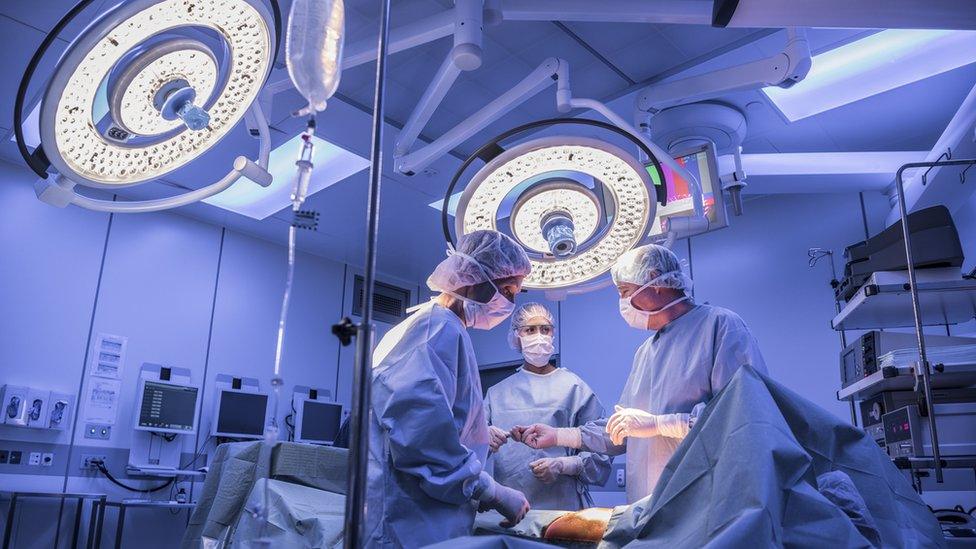Do NHS operating theatres really have 'wasted time'?
- Published

The BBC story about wasted time in operating theatres has generated a lively debate.
We reported that analysis by the regulator NHS Improvement showed there could have been 280,000 more non-emergency operations, at 100 English hospital trusts, last year.
There were said to be 140 minutes of unused time per operating list.
So, is it simply a case of improving efficiency, or are there wider problems that need to be addressed across the NHS?
Are the solutions to be found in the way operating theatres are managed or are theatre staff having to stand idle because of logjams elsewhere in the system?
It is a highly topical debate because demands for more money for the NHS are growing ahead of the Budget.
The Treasury, for its part, will want to be assured that the service is continuing to improve efficiency and make the best use of existing resources.
Acute bed shortage
The most obvious factor highlighted in response to our story was the acute shortage of beds in most hospitals.
Medically fit patients are often unable to leave because of delays in arranging social care in the community.
That leaves fewer beds for incoming patients needing planned surgery.
All this can leave frustrated surgeons and their colleagues unable to operate.
Prof Derek Alderson, president of the Royal College of Surgeons, put it thus: "There's this constant backlog all the way through - so the new patient cannot get into hospital because the last patient is still in the intensive care unit and as yet cannot get back to the ward because the ward patient cannot go home."
NHS Improvement's analysis allowed for 5% of time on an operating list to be lost because of last-minute cancellations.
It also excluded any periods of unused time of less than 60 minutes as no procedure could be carried out in that time.
So, in effect, it tried to take account of the likelihood that lists may be disrupted each day because of issues such as bed shortages.
Some hospitals will argue these assumptions underestimate the problem.
A consultant anaesthetist, Mark Alexander Price, made the point that operations, and the process before patients were taken to theatres, took longer than they used to - so it was harder to embark on them with finite time slots.
Patients are older and and, thanks to medical advances, are being considered suitable for surgery that would not have happened 20 years ago.
Obese patients need longer for the anaesthetic process and are more vulnerable to complications during surgery.
Long-standing issue
On the other hand, one observer recalled the observations of the business leader Sir Gerry Robinson in his BBC TV series on the NHS a decade ago.
Sir Gerry Robinson: 'NHS plot? I wish there was', external
Sir Gerry Robinson: NHS 'not a business', external
Sir Gerry told the Telegraph in January 2007: "The biggest single surprise for me was seeing how under-utilised the operating theatres were.
"I thought they'd be packed - and that this was the reason there was a problem with waiting lists. But it really wasn't like that.
"The theatres simply weren't being managed in any way that I would recognise as being appropriate for an important and expensive resource."
The NHS in England has embarked on two major national efficiency programmes since then.
As reported, Croydon University Hospital has reduced last-minute cancellations of operations by better handling of pre-surgery assessments.
Lists are carefully managed to try to iron out late starts and early finishes.
The number of cases dealt with each year has increased by 1,200.
The new thinking was driven by surgeons and other clinical staff, including a matron.
PA Consulting has worked with Hillingdon Hospital to increase theatre utilisation from 75% to 82%, which is an additional 20 hours per week operating capacity. The aim is to get to 90%.
Some have accused the BBC of running down the NHS by implying it could be more efficient and that resources could be better deployed.
Highlighting Croydon's achievements, however, suggests that dedicated NHS staff are driving improvements with the aim of improving the levels of care they can offer.
Unused operating theatre time does nothing to help doctors and nurses achieve their goal of helping more patients.